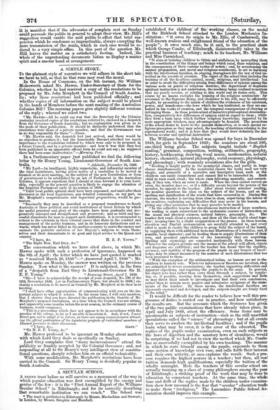A. SIMPLE STORY.
-To the plaineit style of narrative we will adhere in the short tale we have to tell, so that he that rims may read the_moraL In the House of Commons, on the 8th instant, Sir William Molesivorth asked Mr. Hawes, Under-Secretary of State for the Colonies, whether he had received a copy of the resolutions to be proposed by Mr. John Morphett in the Council of South Austra- lia; why those resolutions had been published officially ; and whether copies of all information on the subject would be placed in the hands of Members before the next reading of the Australian Colonies Bill? The morning papers give slightly different versions of the reply ; whereof we select two.
"Mr. Haw-sis—All he could say was that the Secretary for the Colonies yesterday received copies of the resolutions referred to, enclosed in a despatch from the Governor of South Australia; but no explanation was given as to the mode of their publication. It should be distinctly understood that the -resolutions were those of a private member, and that the .Government was inns way responsible for them."— Times. "Mr. Hawas said, the despatch had just arrived, and there would be no objection to produce it ; but the honourable Baronet attached too much importance to the resolutions referred to, -which were only to be proposed in a future Council, and by a private member : and how it was that they had been published in an apparently official form be could not say; he supposed therelad been some inadvertence."—Norning Post.
In a Parliamentary paper just published we fund the following letter by Sir Heniy Young, .Lieutenant-Governor of South Aus-
tralia. "Adelaide, November 16, 1849. "My Lord—An intelligent, highly respectable, and influential member of the local Legislature, having given notice of a resolution to he moved in Council at its next meeting, on the subject of the new Constitution or form of ,government to be established by an act of Parliament in the Australian Colonies, it. appears expedient that I should at once forward it to your-Lord- ship, especially as the general question is likely to engage the attention of the Imperial Parliament early in its session of 1850.
"Until local public opinion shall have been expressed, and tmtil after their discussion in the local Legislature, any detailed comments, on my part, on Mr. Morphett's comprehensive and important _propositions, would be pre- mature.
"Succinctly they may be described as a proposed transference to South Australia of those political and social institutions of Great Britain by which the useful grandeur and glory of the empire have been gradually and pro- gressively enlarged and strengthened and preserved; and as tried and suc- cessful stimulants for men to support such institutions it is recommended to .extend to the colonists in their colonial career that share in -the conduct and management of the public business, and in its honorary cruninctions and re- 'wards, which has -never failed in the mother-country to nerveihe energy and animate the patriotic ambition of her Majesty's -subjects to train them- valves and their descendants to do good and loyal service to the Queen and country.
" I have &c. 31. E. F. Yonne." "The Bight Hon. Earl Grey, &e."
The conversation which we have cited above, in which 'Mr. Hawes spoke -with such a profession of ignorance, happened on the 8th of April : the letter which we have just quoted is marked as "received March 26, 1850"—" Answered April 7, 1-850 " : Mr. Hawes spoke on Monday, the answer -was written on the previous 43unday. NOW what is the answer ? It is subjoined, in the form of a "-despatch. from Earl Grey to Lieutenant-Governor Sir H.
-E. F. Young." " .Downing Street, April 7, 1850. " Sir—I have to acknowledge the receipt of your despatch, No. 158 :of the .18th November 1848, _Laic in Parliamentary Paper' -but should be 1849,1 en- closing a resolution to be moved in Council by Mr. Morphett at its then next meeting.
"I shall have other opportunities of communicating with you on the im- rtant subject to which it relates. In the mean time, I will only mention, t I observe that you have directed the publication in the Gazette of Mr. biorphett's proposed resolutions, at a time when the Council was not sitting, and apparently some months before the next session, in the ordinary course of business, would commence.
"Tins is a proceeding which does not appear to be in accordaruoe with the practice of -the colony, as fares I am able to ascertain it. And if not, Imust direct you not to adopt it inuture as there are many inconveniences attend- ing the official publication of the legislative projects of individual members of Council previous to their discussion. "1 have, &c.,
"Sir H. E. F. Young, &c." Gazr."
Mx:Hawes professed to be ignorant on Monday about matters With which Lord Grey deals so specifically on Sunday. .responding at all to SirHenry'svery intelligent view of constitu- pulieity so fre:talleietenl.... the Colonial Governor; and, not Lord Grey s that "many inconveniences" attend the tional questions, sharply rebukes him on an official technicality.
With -some modification, Mr. Morphett's resolutions have been carried in the Council. Sir Henry Young is decidedly popular in South Australia.
I I 11 •


























 Previous page
Previous page